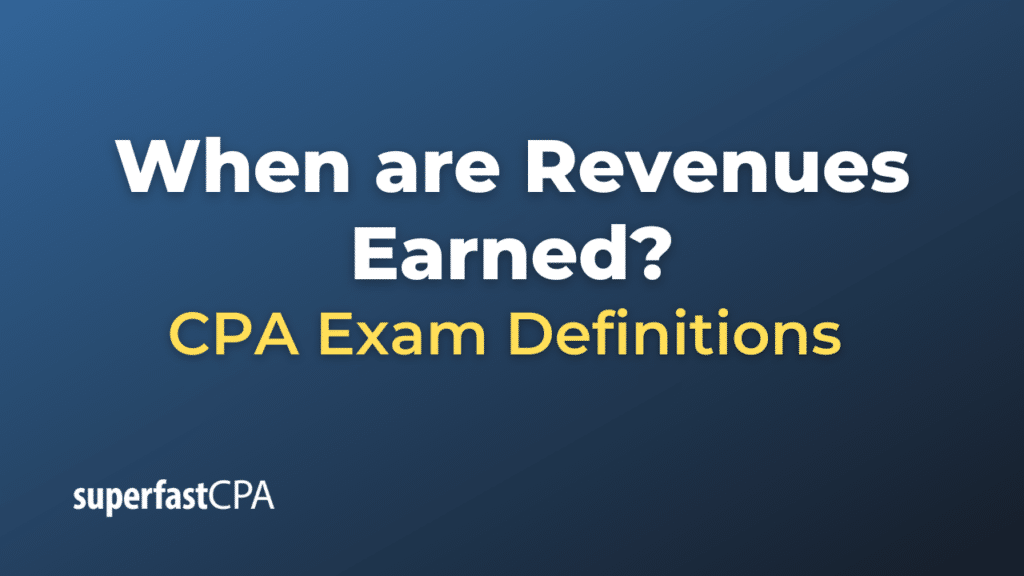When are Revenues Earned
In accounting, revenues are considered “earned” when the company has performed its obligations under an agreement, thereby entitling it to payment. The concept of when revenue is earned can differ depending on the accounting method being used—specifically, cash accounting or accrual accounting.
Cash Accounting
In cash accounting, revenue is recognized (recorded) only when payment is actually received. For example, if a customer pays you $1,000 for a service, revenue is considered earned at the moment the payment is received, regardless of when the service was actually delivered.
Accrual Accounting
In accrual accounting, revenue is recognized when it is earned, not necessarily when payment is received. Revenue is earned when the goods are delivered or services are provided, and there is a reasonable expectation that the payment will be received in the future.
Examples of When Revenues are Earned in Accrual Accounting:
- Sale of Goods: If you sell a product, revenue is earned when the product is delivered to the customer, and the customer takes ownership.
- Provision of Services: If you are a consulting firm, revenue is earned when the consultation service is performed, even if you bill the client at a later date.
- Milestone Payments: For long-term contracts, revenue may be earned at various milestones. For example, a construction company may recognize revenue when certain phases of a project are completed.
- Subscriptions and Memberships: For services rendered over a period of time, such as magazine subscriptions or gym memberships, revenue is typically recognized over the duration of the subscription or membership.
Example of When are Revenues Earned
Let’s consider a hypothetical example involving a web development agency, “WebDev Co,” to illustrate when revenue is earned under accrual accounting.
Scenario 1: Website Development Contract
WebDev Co signs a contract with a client on June 1 to develop a website for $10,000. The contract specifies that the website will be delivered by June 30 and that payment is due within 15 days after delivery.
When is the Revenue Earned?
The revenue is earned on June 30, when WebDev Co completes the website and delivers it to the client, thereby fulfilling its obligation under the contract.
Journal Entries:
- June 30 (upon delivering the website):
Dr: Accounts Receivable $10,000
Cr: Service Revenue $10,000- July 10 (upon receiving the payment):
Dr: Cash $10,000
Cr: Accounts Receivable $10,000Scenario 2: Monthly Maintenance Service
WebDev Co also offers a monthly maintenance service for $500 per month, billed at the end of each month. Clients pay for the service within 10 days of receiving the invoice.
When is the Revenue Earned?
The revenue is earned throughout the month as WebDev Co performs maintenance services for its clients.
Journal Entries:
- End of the month (upon providing the service):
Dr: Accounts Receivable $500
Cr: Service Revenue $500- Upon receiving payment (assume it’s received on the 5th of the next month):
Dr: Cash $500
Cr: Accounts Receivable $500Scenario 3: Prepaid Web Hosting Service
WebDev Co offers web hosting services, and a client pays $1,200 in advance for a year of hosting on June 1.
When is the Revenue Earned?
The revenue is earned over the course of the year as the hosting services are provided. It must be initially recorded as unearned revenue (a liability) and then recognized as revenue over time.
Journal Entries:
- June 1 (upon receiving the prepayment):
Dr: Cash $1,200
Cr: Unearned Revenue $1,200- End of each month (as the service is provided):
Dr: Unearned Revenue $100 (i.e., $1,200 / 12 months)
Cr: Service Revenue $100In each of these scenarios, under accrual accounting, revenue is recognized when it is earned—when the goods or services are delivered or provided—not necessarily when cash is received. This aligns with the accrual basis of accounting, which aims to match revenues with the expenses incurred to generate them, providing a more accurate picture of a company’s financial condition.













